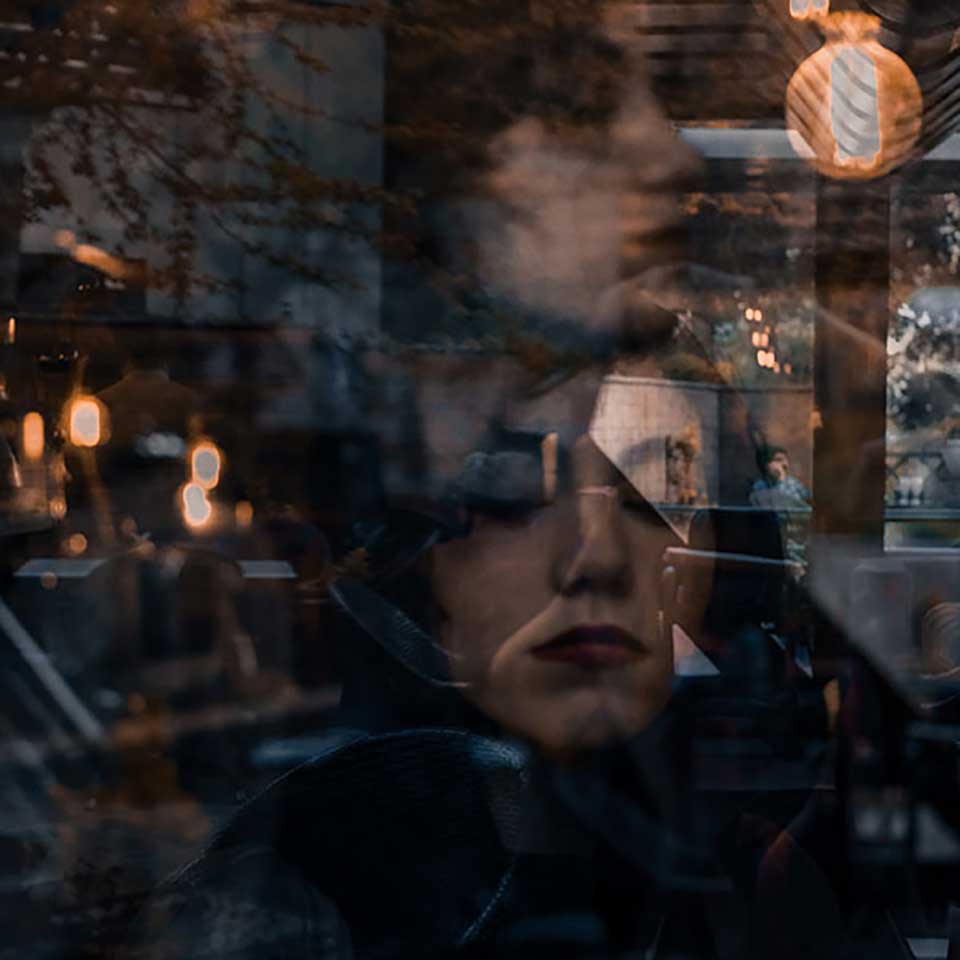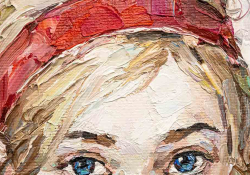The Other Woman

A stalled train and shifting visage make for an eerie commute.
I could’ve stayed in bed a little longer, but what for? Surely that would only make things worse. Lately I’d been swamped with work, I’d slept very little, and I’d had anxiety-ridden dreams that, upon waking, I almost never remembered. I dragged my feet to the bathroom, turned on the light, and twisted the shower knob. It wasn’t until I was under the falling water that I opened my eyes fully. Then I dried myself off and got dressed, in the clothes I’d left on top of the toilet seat the night before. I brushed my hair in front of the mirror, paying little attention to my weary eyes and irritated expression. Then, all at once, I focused on my reflection: there’s no doubt that one changes with the years, with the passage of time, adversities, the care one does or doesn’t offer to one’s face, stress, worries. I’d already noticed the appearance of a modest second chin and the bags that grew beneath my eyes. But what I saw in the mirror was none of that. It simply wasn’t my face. It didn’t seem younger or older—it just wasn’t mine. She looked a bit like me, the same bags under the eyes, the same shape of the brows, the same thin and tense lips; but the nose was longer and more narrow, the eyes farther apart, the chin rounder and too small for my face. I continued brushing, concentrating on my hair to not pay so much attention to that face. I thought that I must be very tired and that my mind was playing a bad trick on me. I pulled my hair into a ponytail and put a bit of mascara on the eyelashes. I brushed my teeth, grabbed my bag and keys, and made my way to the office.
I had so much to do that I always left work exhausted and never felt the desire to do absolutely anything afterward. I would throw myself across my bed to read for a bit or watch television. Invariably I would fall asleep there until my hunger woke me, and I’d prepare myself something quick and cold. Immediately after I would fall back asleep. Supposedly, this intense pressure at work was something transitory, but my coworkers and I started to suspect that it would be like that forever. They’d fired two of our coworkers and split all their projects among the rest of us, promising that soon reinforcements would arrive, but it didn’t happen.
Supposedly, this intense pressure at work was something transitory, but my coworkers and I started to suspect that it would be like that forever.
On the way to the Metro I thought about the work awaiting me and what I would take on first. The sound of my shoes, with their worn-down heels, interrupted my thoughts. I’d planned to take them to a cobbler the past weekend, but I’d forgotten, and now the sound they made as they slapped on the floor was irritating. The Metro platform was packed. I headed to the women-only section, noticing the smell of perfume, lotions, and deodorant. The majority were dressed in office wear: blazers, cashmere pants, silk blouses, heels. The common denominator was desperation. Some cursed through their teeth, and others gazed down the tunnel with resigned expectation. It wasn’t normal to see such a pileup of people waiting on the platform at this time or for the trains to be so delayed.
We started to sweat, partly because there were so many of us and partly due to the anxiety. I leaned against the platform wall. To my side there were three street vendors who looked like they’d attended a very fun party that ended in tragedy. Their makeup ran down their faces and necks, and their hair—originally fixed in place with gel and hairspray—now floated freely about their heads. One of them had an enormous speaker on her back. The youngest one sold candies, and the third carried a closed backpack. I waited for several trains to pass, observing the terrible struggle to find a spot on each one. Every time a train approached, the women got dangerously close to the platform’s edge.
The common denominator was desperation.
After half an hour I managed to get on a train. There were fewer people, and it seemed the flow of trains had normalized; I even managed to sit in an empty seat. I was calm, thinking again about the work waiting for me in the office, when I saw my reflection in the window’s glass. At first I was a bit scared. A strange face with a vague resemblance to mine looked at me, perplexed and attentive. I opened my bag in search of a mirror but couldn’t find one. I touched my chin and cheekbones, and though I felt my fingers’ contact, I felt that I was stroking a stranger’s face, one that belonged to some other woman.
A profound and irreparable sadness poured over me. In what moment could I have changed so much? This didn’t happen overnight. I looked at the woman sitting next to me. She was around forty years old, with her hair dyed blonde and in artificial curls, her eyebrows drawn in with a light brown pencil where they might have been if she had any. Dark shadows colored her eyelids, pink blush on her cheeks, and coral on her lips. She looked pretty and satisfied with her appearance.
Again I looked down the tunnel we were traveling, and once more the reflection of that strange face looked back at me. Then a vendor who sold wallets with a mirror inside got onto the train, and without hesitation I bought one. I opened it immediately and looked at myself again. I took out my work ID. I looked at the ID photo and brought the mirror closer. Yes, we looked alike, but we were not the same. And though the new face wasn’t unpleasant, I still felt that I liked the one from before more. Suddenly a terrible worry entered my mind: What if my coworkers, my friends, and my family didn’t recognize me? I looked back at the ID photo and at my reflection more carefully. The differences weren’t notable one-by-one, but once seen in conjunction they were obvious. The changes were subtle, not like in those plastic surgeries where the nose comes out small and pointy, or where the cheekbones become so distinct they seem swollen.
A couple of stations before arriving at my stop, the Metro stopped in the middle of the tunnel. The lights went out and the sound of a screech was followed by a prolonged exhalation, as if the motor was letting out its last breath. The dark silenced the murmurs in the train. The silence was so dense that I could almost hear the other passengers breathe: someone stirred in her seat, there was the sound of a curse word, the click of a case, a plastic bag shuffling. Time passed, but the train didn’t move. Though this type of pause is normal, soon we began to worry. The lights stayed off, no train passed in the other direction, and we didn’t hear the motor turn back on. There, in the darkness and far from the outer world, I tried to remember my face in memorable moments, like the time my friends surprised me with a birthday party in my apartment, or just last month, when I was given a pay raise. I tried to remember that time a childhood friend and I met up again after twenty years, but I couldn’t. One does not see her own face as she lives; if anything, it’s possible to remember the faces of others. I grew sad to think of how little I knew myself, not even clearly remembering my own emotions in those moments. In the darkness I touched my face again, calmly, and my hands did not register the memory of my features. There was something strange; the tips of these fingers knew that this woman was not me.
A woman behind me shouted, in the height of a panic attack. In the shadows I made out other passengers trying to calm her down as she said she couldn’t breathe and wanted off the train. Someone pulled the emergency alarm. The woman sitting next to me stood up and gave the shouting woman a slap across the face. Silence took over again; all that sounded was the echo of the alarm, distant and monotonous, as though it was going off somewhere else. Somebody was crying. Suddenly many women began speaking at the same time, some in yells, some in murmurs and sobs. We’d been trapped in the middle of a dark tunnel for almost an hour. Some spoke to the passengers in the other cars, half their bodies hanging out the wide-open windows. Others tried to open the doors that connected the train cars, hoping to walk to the front and try to get out. The silence was invaded by confused shouts, wails, blows to the train car’s doors and insides; things started falling out onto the rails—it seemed that the people were rioting. Someone fainted. I thought that none of this could really be happening.
More time passed in chaos and confusion. I leaned against the window with other women at my side, and we were all yelling incoherently. Someone told us that outside a civil war had broken out and we’d been forgotten, someone else said that an earthquake had destroyed the city, there was also talk of sabotage by an organized crime group, of a protest by disgruntled ex-employees.
Then lights appeared in the depths of the tunnel, lights that moved like stray fireflies. The silence came back, and little by little the lights became more intense and precise. We managed to make out a group of men with yellow helmets who were coming to rescue us. They forced open the train doors and placed inflatable mattresses below so we could jump out. The women threw themselves out immediately, without considering the dangers and ignoring the rescuers’ directions. Nobody tried to help, and everyone wanted out first, pushing themselves forward, kicking. One let herself fall onto the tracks in complete desperation, and there was the sound of a dry thud and a shout. I kept far away from the doors until the cars began to empty. At the start they’d asked us to take off our shoes to jump on the inflatable mattress. But it began to lose its air, as nobody wanted to part with their heels, bags, umbrellas, and all the other objects that ended up harming it. Most of us had to lower ourselves slowly by our hands, sliding our bodies down until the rescuers were able to support our legs, and then our waists, to place us on the floor. They moved us in groups of twenty people down the dark tunnel toward the next station.
We walked in silence, concentrating on the heavy darkness of the tunnel, because the flashlights the rescuers brought weren’t enough for all of us. We couldn’t tell when we got to the station, because there was no light there either and the platforms were deserted. We came up little by little, taking the stairs and improvised ramps. Most of us tried to find our own way out as best we could, anxious to exit as soon as possible.
The Metro had collapsed, as someone had guessed a while back and as we’d all started to suspect with more and more certainty. It was obviously a misfortune for the city, but nothing as serious as all the tragedies we’d speculated about on the train.
The streets were in chaos. There were buses giving free service, but it was practically impossible to get on one. No taxis were available. I walked, feeling exhausted, as though those minutes I’d been trapped in the tunnel had been days in reality. I was very thirsty and my mouth was dry.
Soon, without quite knowing how, I arrived at work. Though most of my coworkers had cars, from the moment I entered the building I heard everyone talking about the Metro incident. I went directly to the bathroom. I splashed water on my face and saw, again, that face that wasn’t mine. Of course it seemed that I was the only person who noted the change, because my coworkers had greeted me as though I was the same person as all the other days. Then I spent several hours before my computer, looking over papers, drinking coffee, and nibbling cookies. Toward the end of the day, when I turned off my computer, I saw my distorted reflection in the dark screen. I took the mirror out of the wallet I’d bought and observed it for a while; it was me again, with the same face as always, the features returned to their original appearance, and I breathed out in relief. And, just to confirm, I took out my work ID to compare. But something strange had happened: the photo on the ID was of the other woman, the one I’d seen in the mirror that morning and those minutes on the train. Again that small chin, those far-apart eyes, and that long nose, belonging to some other woman, some other who is not me.
Translation from the Spanish
Editorial note: From Bibiana Camacho’s 2013 collection La sonámbula. Read Cecilia Weddell’s note about translating this story from this same issue.











